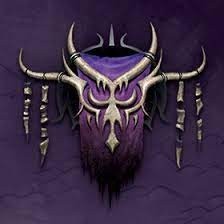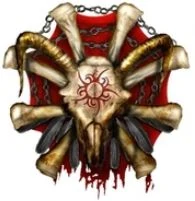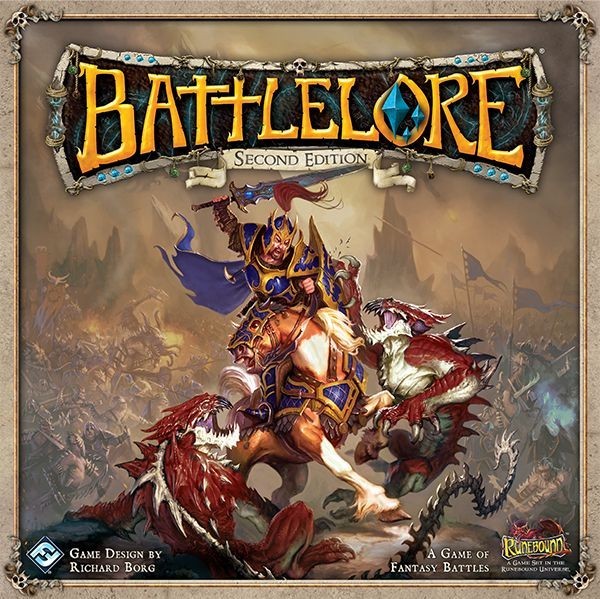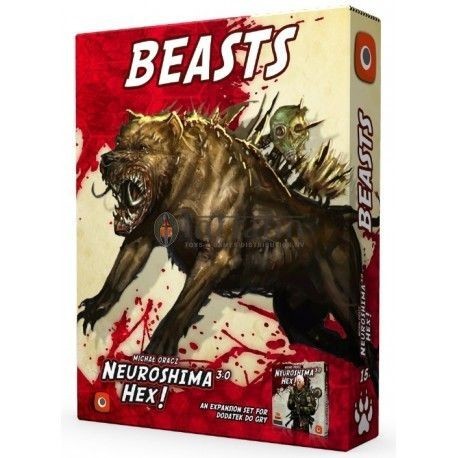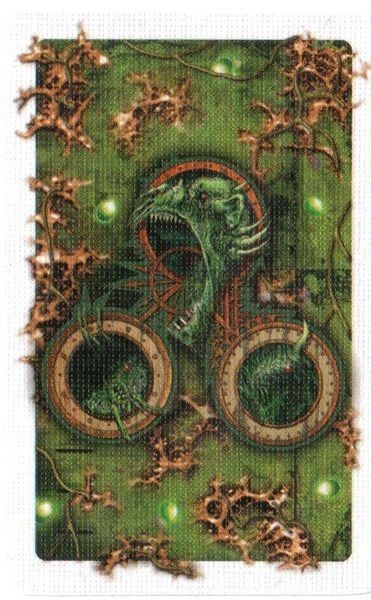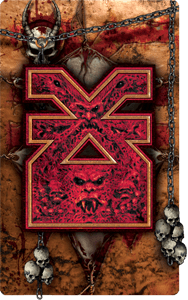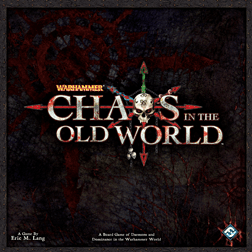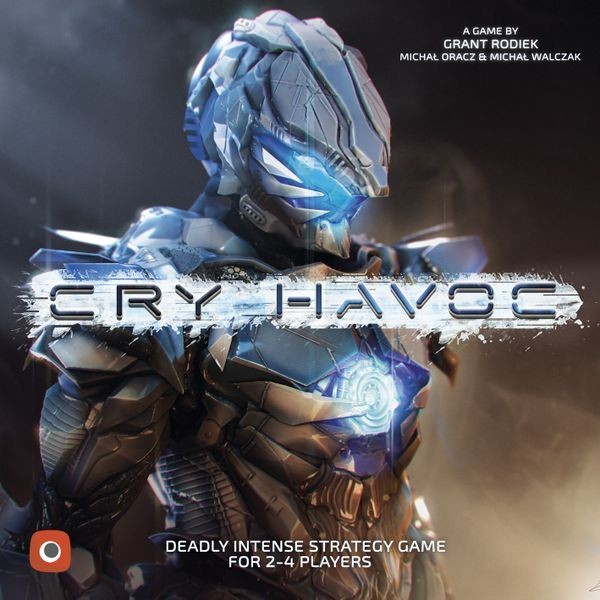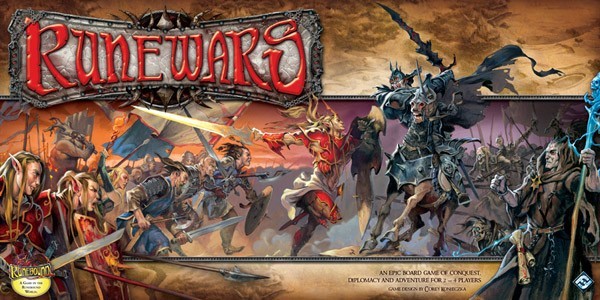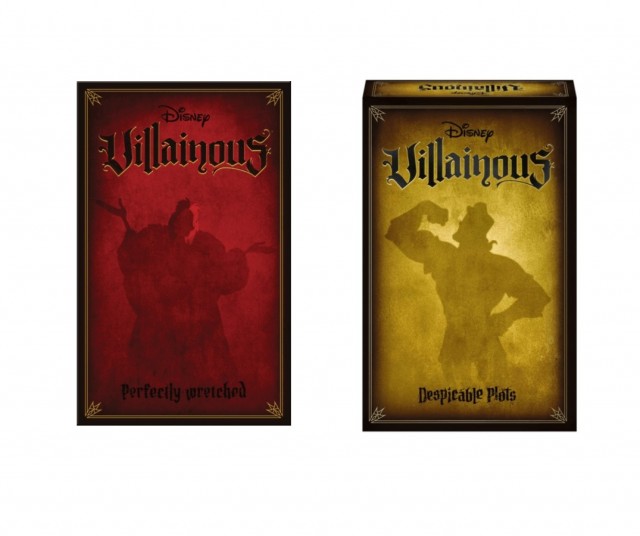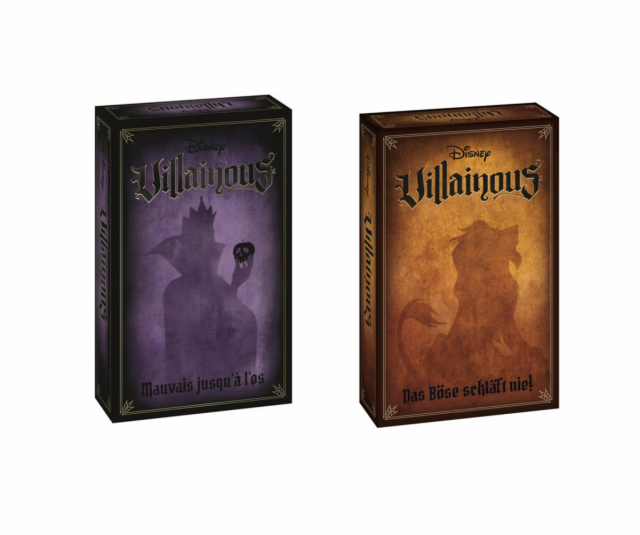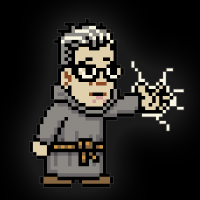The definition of what a deckbuilder should be.
"Wait!," I hear you saying. "Rune Age? That can't be a "From the Depths"! That came out in 2011."
Well, yes. It did. But it came out to very little fanfare among what was a glut of deckbuilding games of the time; the dominant forces of which were Dominion and Ascension (and Thunderstone, kinda.) Rune Age was just another contribution to the Terrinoth universe by FFG, following on the heels of the successful Runewars board game. This was during the time when designer Corey Konieczka (also the lead designer of Runewars) was rising to prominence at the company and one could almost imagine that this was FFG giving him the opportunity to take a dive into what was the latest craze in the board/card gaming world, while also expanding awareness of the lore and races of the world of Terrinoth.
But I think the game has a lot more to offer than just being another Rune-whatever game that seemed more marketing angle than real design endeavor. First and foremost, it escaped the pitfall of a lot of deckbuilders in that it wasn't multiplayer solitaire. Games like Dominion and Race for the Galaxy are essentially exercises in seeing how long you can keep complete silence in a room, broken only by the slight click of a card being placed on the table. There's often no need to interact with your opponents whatsoever, as you're just trying to construct your individual engine, regardless of what they do. Rune Age, OTOH, requires interaction with your opponents in all 6 of its scenarios. Whether you're semi-cooperating to defeat a dragon lord or competing to build the grandest momument or outright trying to knock each other out of the game, there's no way to just sit silently and draw cards when you're playing Rune Age. Given that I tend to view gaming as a highly social activity (a quality that I believe has led to my disaffection with games like Hearthstone), that was an immediate (ahem) draw for me.
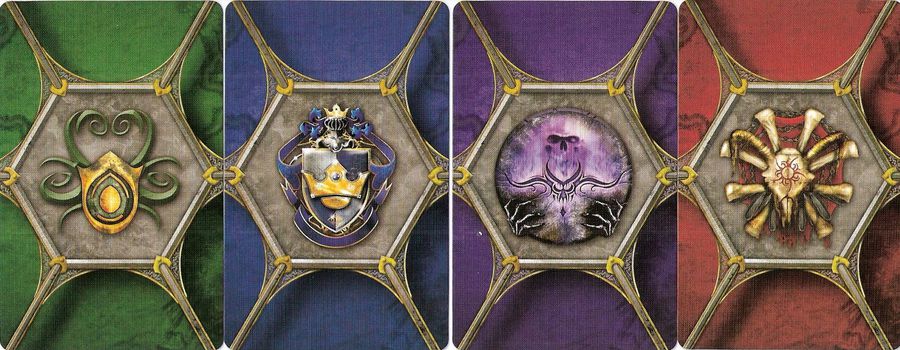
But, just as importantly, Rune Age contains four (and with the expansion, six) factions that all play in a significantly different fashion from each other. Compare this to Dominion and it generates one of my Basic Gaming Questions: Is the phenomenon of "variable player powers" a point of interest or implied complexity for the average gamer? We'll get back to that in another article, but suffice it to say that the six factions in Rune Age create both replayability and playstyle interest. If you don't like games like Dominion, you simply won't like the game. But if you don't like playing Rune Age as the Uthuk Y'llan, but do like playing as the Daqan Lords, then a door of accessibility has been opened. Additionally, with the six different scenarios (Cataclysm: pure co-op victory; Resurgence of the Dragonlords: partial co-op with competitive victory conditions; Ascent of the Overlord: many vs. one; The Monument: competitive victory; The Quest for Power: competitive victory; and Runewars: purely competitive with player elimination), you can play six different versions of Rune Age in the same way you can play different versions of the same game of Runebound. That, too, provides accessibility. If you like co-op games, you can play the Cataclysm scenario. If you like total slugfests, you can play the Runewars scenario. And I'm not going into great detail on the variety of neutral and mercenary cards and scenario events present in the game. But I will touch on how each faction plays...
Daqan Lords: Similar to their approach in Runewars and Battlelore, 2nd Ed., the Daqan are a durability oriented faction, whose units tend to assist each other. The Daqan player wants to get his Footmen engine going early, not only to enable a string of follow-up actions when attacked by another player, but also to use those Footmen to enable Bowmen eliminations of the enemy, Novice Wizard card draws (potentially of more Footmen), and strength boosts of your Siege Towers. Knights further this engine by enabling the draw of yet more Footmen, while Roc Warriors potentially restart that engine if it ever halts by bouncing a Footman back to your hand. None of your units do anything particularly flashy. It's just solid, careful play that can overwhelm an opponent with a series of basic actions.
Uthuk Y'llan: Just as in Runewars and Battlelore, the key element of Uthuk strategy is figuring out when self-sacrifice is the better play. Since wounded cards in a battle are sent back to the Barracks and must be purchased again, rather than simply discarded and redrawn, the Uthuk player is often going to spend more time (and Gold) re-purchasing units. The upside is that the Uthuk player should also be in a good position to win key battles, since their 1 strength cards, Berzerkers, can easily become 3 strength cards just by using the "when played" effects of the majority of the rest of their units, such as the drawing engine of Flesh Rippers. It is key, however, to get a Warlock Chieftain or two in your deck so that you can rescue units (like the self-wounding Blood Sisters or the expensive Chaos Lords and Obscenes), rather than have to buy them back every turn. The powerful Obscenes remain one of the more effective units in the game when properly used, just like in Battlelore.

Latari Elves: The Latari are Influence-dependent. No other faction is so closely tied to its strongholds and cities, so it's important to acquire one or more of those early on. However, no other faction can become such a rolling snowball in the late game, either, once that Influence machine is up and running. A single Deepwood Archer can enable you to spend 6 influence in a turn if the right city is on your board, which can secure some quite powerful neutral cards. It's important to figure out a rhythm of when to dump Storm Sorceresses for that resource, as well as how to properly cycle with Pegasus Riders. The amazingly versatile Leonx Riders (discard or draw) and the direct Darnati Warriors are easier to understand. Meanwhile, Forest Guardians may be the best high end card in the game, but remember that they can be destroyed by card effects; just not in combat.
Waiqar the Undying: Similarly to the Daqan, the real power of Waiqar's faction is generated from the lesser units. Reanimates and Skeleton Archers depend on a swarm theme to win battles. However, your ability to swarm is massively enhancd by Necromancers and Vampires, both of which can easily arm the Reanimate cannon, with the Vampires enabling future draws or even priming the Necromancers' ability to raise things from the discard. In contrast to most of the other races, the Black Knights and Barrow Wyrms of Waiqar are a little underwhelming, unless you're able to really pack your board with Reanimates for the Knights or have been able to drop a Necromancer or two into your discard pile for the Wyrms. Timing is everything with the undead and you're often better off just swarming to the win.

Dwarves of Dunwarr: The Dwarves are the one faction that often doesn't want to eliminate smaller Gold cards from their deck, since they can be used to power the targeted elimination of Sentinels, the strength boost of Digging Machines, and the awesome army-wide strength boost of War Machines. The key to using the Dwarves is finding the right level of what are relatively useless Gold cards in the late game, but which can also enable some huge late game victories in battle. A Demolitionist is a good early pickup, since it will be highly disruptive to most of your opponents that will be dependent on their Gold draw to build their forces. Guardians are also the only other unit in the game besides the Latari Forest Guardian to simply have a static effect when they're in play that can be extremely timely. As with most Dwarf factions in fantasy games, Dunwarr is slow, but devastating.
Orcs of the Broken Plains: The Orcs are an aggro deck. You want to empty your hand in every encounter in order to boost the strength of your Ravagers and take advantage of the drawing of your Spiritspeakers and the targeted elimination of your Lizard Riders. Of course, you can't do all of those things at once, since all of them require you to have 0 cards in hand so, as with Waiqar, timing with the Orcs is often crucial. Beastmasters are perhaps the best late card in a battle with another player, since it will represent a way to weaken your opponent's forces in hand, rather than on the board; only to be followed by a Lizard Rider to weaken the board. The Warchief represents a way to clear unneeded Gold from your hand for an immediate return, as well. Cave Trolls are the highest strength unit in the game, which is key, since their ability doesn't often serve the aggro nature of the Orcs.
None of the factions should be considered to have an edge in any of the scenarios, except perhaps the Dwarves in The Monument. All of the scenarios provide some level of challenge, with the base Resurence of the Dragonlords being perhaps the easiest while The Cataclysm is mildly notorious for its difficulty. However, there is so much game play packed into one small package (and one small expansion) that you could easily extract many lengthy sessions out of the game without replaying a scenario that you didn't care for. And, again, all of them demand player interaction, as there's virtually no way to win without it. One side note of interest is that, despite the world of Terrinoth often being dismissed as "generic fantasy", there's actually a great deal of lore in both the main rulebook and on some of the cards that fleshes out the world and its background as much as any other Rune game that FFG has ever produced. There aren't many deckbuilders or card games, period, that can be given the label of actually presenting a story, in addition to sound mechanics. That's why I think Rune Age deserves to be looked at again and not lost at the back of your game shelf.

 Games
Games How to resolve AdBlock issue?
How to resolve AdBlock issue? 